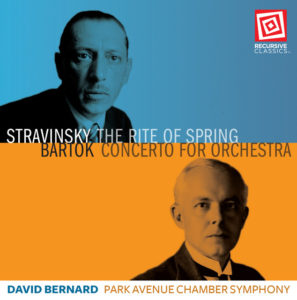David Bernard and New York’s Park Avenue Chamber Symphony bravely throw their hats in the ring with this recording of two warhorses in the face of competing discs available from almost any of the world’s great orchestras. Bernard’s interpretations are pretty much straightforward, free of any distracting mannerisms, but also offering no new insights. The orchestra’s strengths lie in the brass, which plays impressively well in the Stravinsky, and, to a lesser degree, the woodwinds, which sound very good in the Bartók.
The ensemble’s weakness, and it’s a pretty big one, is the string section, which, on evidence here sounds to be minimally staffed. The resulting thin sound doesn’t meet the requirements of either work—especially the Bartók, with its many coloristic string passages. Also, the violins are not always in tune with each other (quite surprising, given the small number of players), all of which makes for some unpleasant, fingernail-on-chalkboard moments in the Rite of Spring’s Part 2 Introduction, and in the Concerto for Orchestra‘s Elegy.
Even with the orchestra’s limitations, you can sense the players’ excitement at taking on these popular, challenging pieces, an aspect that will be ingratiating to fans, supporters, and neighbors of this community ensemble. And it is to those, and those only, that this disc is recommended.
































